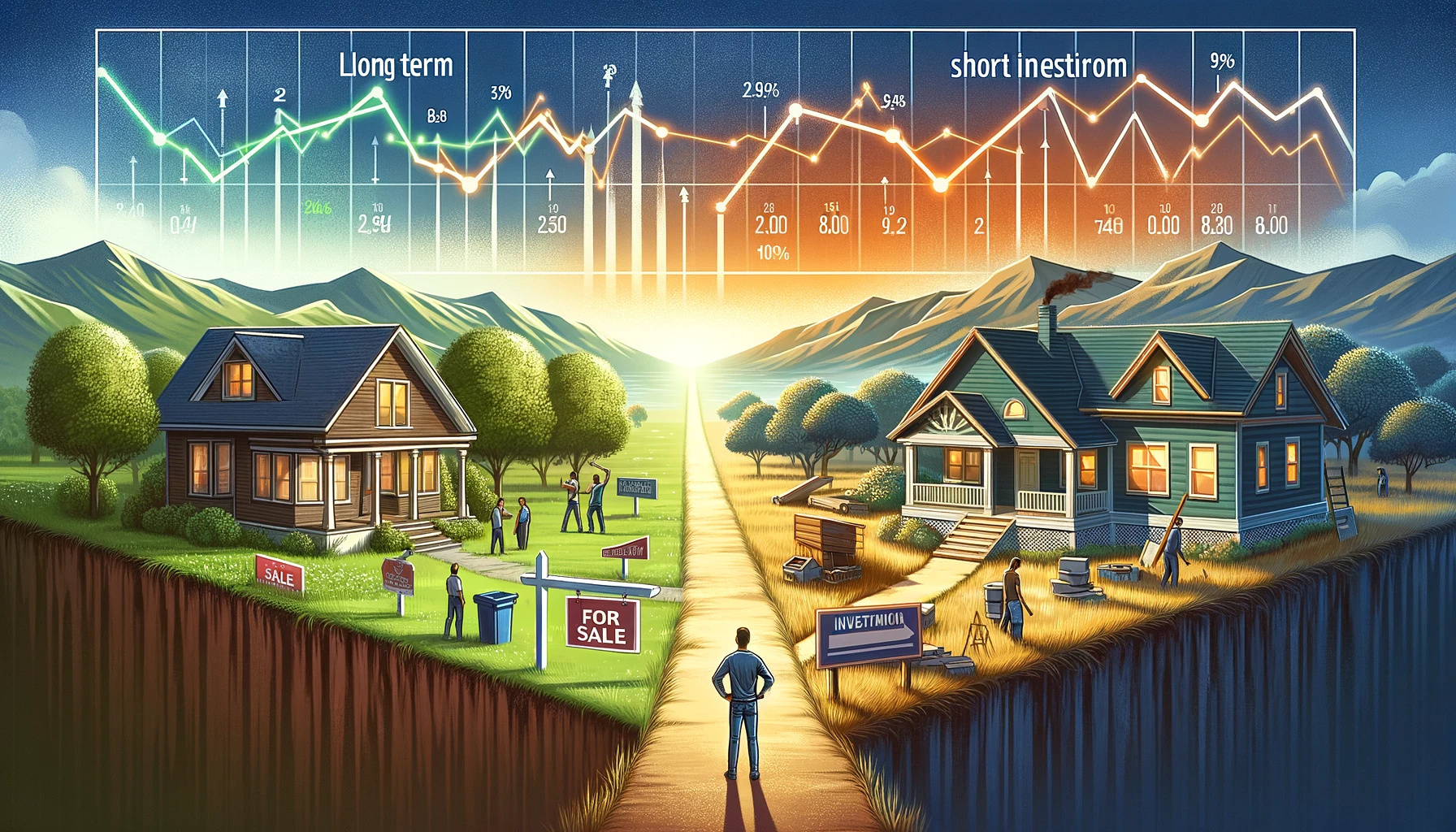How Interest Rate Changes Will Shape Real Estate Investing in 2024

As we enter 2024, the real estate investment scene is witnessing a dynamic shift, primarily influenced by the ebb and flow of interest rates. These rates, often seen as the heartbeat of the financial world, profoundly impact various aspects of real estate investment, from property pricing to rental yields and investor sentiment.
This article will explore the complex yet fascinating interplay between interest rates and real estate markets. We aim to understand how these rates work, their current trends, and the broader implications for real estate investors.
Delving deeper, we will examine strategic investment decision-making in a landscape characterized by fluctuating interest rates, comparing how different real estate investments respond to these changes. We’ll also discuss the merits of adopting a long-term versus a short-term investment approach in the current economic climate. Finally, we’ll equip you with practical tips and strategies to navigate and adapt to potential future rate changes, ensuring your real estate portfolio remains robust and agile.
Whether you are a seasoned investor or just starting, this comprehensive guide will offer valuable insights and help you align your investment strategies with the pulse of the 2024 real estate market.

Understanding Interest Rates and Real Estate Investments
The intricate relationship between interest rates and real estate investments is foundational to comprehending the 2024 market dynamics. Interest rates, set by the Federal Reserve, influence borrowing costs, directly impacting how investors and homebuyers approach the market. When rates are low, borrowing becomes more affordable, leading to increased property purchases and higher property values. Conversely, higher rates can cool down the market, making loans more expensive and potentially slowing down real estate activity.
This fundamental understanding is crucial for real estate investors looking to navigate the complex terrain of property investment in 2024, especially in a fluctuating economic environment.
2024 Interest Rate Trends and Their Implications
As of March 2024, interest rates have been gradually increasing following historical lows. The current Federal Reserve remains unchanged at 5.50%, a notable rise compared to previous years. This uptrend signals a shift in the real estate investment landscape, urging investors to reassess their strategies. The increasing rates will affect mortgage affordability, potentially slowing the residential market’s growth pace.

However, for the savvy investor, this also presents opportunities in markets that might see reduced competition. Additionally, the outlook for the rest of the year suggests a continued, albeit cautious, rise in rates, as the Federal Reserve aims to balance economic growth with inflation control. Keeping abreast of these trends and forecasts is essential for strategic investment planning in today’s real estate market.
Strategic Investment Decisions in a Fluctuating Interest Rate Environment
Making strategic investment decisions becomes paramount in an environment where interest rates are variable. Investors should focus on markets and property types that offer resilience and potential for growth, even in higher interest rate scenarios. This could mean prioritizing properties in high-demand areas or those with strong rental yields. It’s also crucial to consider the cost of borrowing and seek financing options with favorable terms.

Investors can pursue Creative finance options to increase the return on specific deals during high interest rates. Diversifying your real estate portfolio can hedge against market volatility, spreading risk across different types of properties and locations. Additionally, staying informed about rate predictions and economic indicators can help investors time their purchases and sales more effectively, maximizing returns despite the challenges posed by a shifting interest rate landscape.
Off-Market Real Estate Investments
Traditional investment avenues are increasingly challenging, pushing investors to explore more creative strategies. One such strategy is the pursuit of off-market deals – the under-the-radar opportunities that offer significant opportunities amidst challenging markets.
Off-market properties are not listed on public marketplaces, providing a unique advantage. They often come at a significant discount and present creative financing options, which can eliminate the need for traditional mortgages.
While offering significant advantages, off-market deals are not without their challenges. They require a more hands-on approach, are time-consuming, and are harder to find than their on-market counterparts. However, the savvy investor can navigate these waters with the aid of wholesalers. Wholesalers specialize in finding and negotiating off-market deals, acting as intermediaries between sellers and investors. They possess the expertise and network to unearth these hidden gems, offering investors a streamlined path to securing off-market deals.
HomeStakes Will Help You Find Off-Market Deals
HomeStakes is teaming up with top wholesalers in our network to bring you something special. We will be putting together lists of the best off-market deals just for our investors and readers. These aren’t on-market listings; they are hidden gems you won’t find anywhere else, making more room for profit in the deal! Soon, we’ll start sending these exclusive lists to subscribers’ inboxes. With HomeStakes, you’ll have the inside track on incredible deals before they hit the mainstream.
Stay tuned for updates on when these lists will hit inboxes! Make sure to subscribe to our newsletter to get updated information.
The Impact of Interest Rates on Different Types of Real Estate Investments
Interest rate changes can affect different types of real estate investments. Residential properties often feel the most immediate impact, as higher rates can reduce affordability for homebuyers, potentially softening demand. On the other hand, commercial properties, such as office spaces or retail locations, might experience a slower response to interest rate shifts. Understanding these nuanced responses is vital for investors in rental properties and Real Estate Investment Trusts (REITs). While higher rates can challenge financing, they can also increase rental demand, as potential homebuyers may opt to rent instead. This nuanced understanding of how interest rates affect different investment types is crucial for diversifying and stabilizing your real estate portfolio in 2023.
Long-Term vs. Short-Term Investment Approaches
Interest rate fluctuations also influence the decision between long-term and short-term real estate investments. In a rising interest rate environment, long-term investments can offer stability and the potential for appreciation over time, significantly as interest rates drop in the future. However, they may also require locking in higher mortgage rates for the short term. Conversely, short-term investments, such as flipping properties or investing in short-term rentals, can provide quicker returns but may involve higher risk, especially if interest rates rise unpredictably. Investors need to weigh these factors, considering their financial goals, risk tolerance, and current interest rate trends, to choose the best approach with their investment strategy in 2023.
Preparing for Future Fluctuations: Tips and Strategies

While no one can predict the future with absolute certainty, there are strategies that real estate investors can employ to prepare for potential interest rate fluctuations. First, maintaining a solid credit score can help secure better financing options. Secondly, building a cash reserve can buffer against interest rate hikes, especially for those relying on rental income. Additionally, considering fixed-rate mortgages can lock in current rates, protecting against future increases. Lastly, staying informed about economic trends and forecasts enables investors to make proactive rather than reactive investment decisions. Employing these strategies can help build a resilient and adaptable real estate investment portfolio in 2023 and beyond.
Navigating the real estate investment landscape in 2023 requires a keen understanding of the relationship between interest rates and property markets. By staying informed about current trends and outlooks, making strategic investment decisions, and preparing for future rate fluctuations, investors can position themselves for success in a dynamic market. Remember, adaptability and informed decision-making are your most excellent tools in harnessing the potential of real estate investments in a fluctuating interest rate environment.

Member discussion